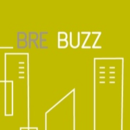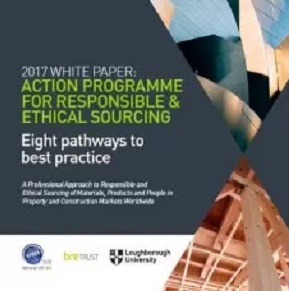Action programme for responsible and ethical sourcing
On 7th September 2017, BRE, together with Loughborough University, launched the Action Programme on Responsible and Ethical Sourcing (APRES): Eight Pathways Model via a White Paper. The aim of APRES is to combat global human rights abuses amidst calls for updated cultural approaches and demands for different working practices.
The model provides a professional approach to the responsible and ethical sourcing of materials, products and people working in property and construction markets worldwide. It presents eight pathways to best practice that takes organisations and individuals from the level of ‘Baseline’ to ‘Best in Class’ performance.
The APRES Eight Pathways Model is a call to action in response to the need for construction and property firms to evidence effective and appropriate policy provision, together with the professional and contractual ability to convert it into practice (along the full length of the supply chain).
Environmental concerns are relevant here, but with the Global Slavery Index estimating that there are 45.8 million people in modern slavery, across 167 countries worldwide – clearly there are major social issues that some businesses must address in the way they operate.
The 2017 APRES White Paper will be of interest to a range of organisations and stakeholders in the construction and property sectors, including: clients and asset owners; contractors; designers and specifiers; manufacturers and distributors; market analysts; professional and representative bodies; purchasing and procurement specialists; subcontractors and suppliers; supply-chain auditors.
The pathways are based on the critical areas of operation in a business: from initial policy-making, via compliance, right through to PR and continuous improvement. The journey to take an organisation from where it is now on responsible and ethical sourcing to where it ultimately wants to be, begins with some very practical steps.
The pathways are designed to be implemented over time, via four stages – preparation (Plan), action (Do), review (Check) and refinement (Improve) – and along eight Pathways:
- Organisation Strategy and Policies.
- Management Systems.
- Assurance: Compliance & Auditing.
- Assurance: Reporting.
- Procurement.
- Financial Management.
- HR, Recruitment, Staff Training & Development.
- Communications, External Relations and PR.
Not all eight pathways’ elements need to operate concurrently – a staggered progression is envisaged. Approaching the implementation process as a journey, involving distance travelled with a sense of direction over time, is a good mindset to adopt, rather than simply seeking to be incrementally better today, than yesterday.
Professor Jacqui Glass, Chair of Architecture and Sustainable Construction at Loughborough University and APRES programme leader, said:
“UK public scrutiny of employment standards and labour rights intensified significantly in 2015 with the introduction of the Living Wage and the Modern Slavery Act.
"It seemed inevitable that tough questions would start getting asked about organisations’ and companies’ ethical policies and practices. In construction, known for its long and complex global supply chains, these questions do not simply stop at the entrance to the building site, or even the UK border.
"The APRES Eight Pathways Model is an important new contribution to knowledge. It builds on on academic research, market intelligence, co-created insights, plus sound management systems and practices from some of the leaders in the field. It answers the fundamental question – how do I embed the right practices in my business?”
Dr Shamir Ghumra, Director Sustainable Products at BRE, the home of APRES, said:
“Accountability is an absolute must for supply-chain excellence and sustainable procurement in the 21st century – the pressure from both public and commercial parties to demonstrate transparency and traceability is not going to go away. The APRES Eight Pathways Model holds the keys to progress and success.”
The APRES Eight Pathways Model will be presented at the 7th annual APRES Conference to be held on 22 November 2017.
This article was originally published here on 7th Sept 2017 by BRE Buzz. It was written by Julia Barnard.
--BRE Buzz
[edit] Related articles on Designing Buildings Wiki
- A traceability framework for the construction supply chain.
- BES 6001 Responsible sourcing of construction products.
- BRE Buzz articles on Designing Buildings Wiki.
- BREEAM recognised responsible sourcing certification schemes.
- BREEAM Responsible Sourcing of Materials.
- Code of conduct.
- Corporate social responsibility in construction.
- Ethical labour sourcing standard.
- Ethical sourcing.
- International Ethics Standards Coalition.
- Modern Slavery Act and sustainable supply chains.
- Modern slavery toolkit.
- Point of supply.
- Sourcing.
Featured articles and news
Inspiring the next generation to fulfil an electrified future
Technical Manager at ECA on the importance of engagement between industry and education.
Repairing historic stone and slate roofs
The need for a code of practice and technical advice note.
Environmental compliance; a checklist for 2026
Legislative changes, policy shifts, phased rollouts, and compliance updates to be aware of.
UKCW London to tackle sector’s most pressing issues
AI and skills development, ecology and the environment, policy and planning and more.
Managing building safety risks
Across an existing residential portfolio; a client's perspective.
ECA support for Gate Safe’s Safe School Gates Campaign.
Core construction skills explained
Preparing for a career in construction.
Retrofitting for resilience with the Leicester Resilience Hub
Community-serving facilities, enhanced as support and essential services for climate-related disruptions.
Some of the articles relating to water, here to browse. Any missing?
Recognisable Gothic characters, designed to dramatically spout water away from buildings.
A case study and a warning to would-be developers
Creating four dwellings... after half a century of doing this job, why, oh why, is it so difficult?
Reform of the fire engineering profession
Fire Engineers Advisory Panel: Authoritative Statement, reactions and next steps.
Restoration and renewal of the Palace of Westminster
A complex project of cultural significance from full decant to EMI, opportunities and a potential a way forward.
Apprenticeships and the responsibility we share
Perspectives from the CIOB President as National Apprentice Week comes to a close.
The first line of defence against rain, wind and snow.
Building Safety recap January, 2026
What we missed at the end of last year, and at the start of this.























